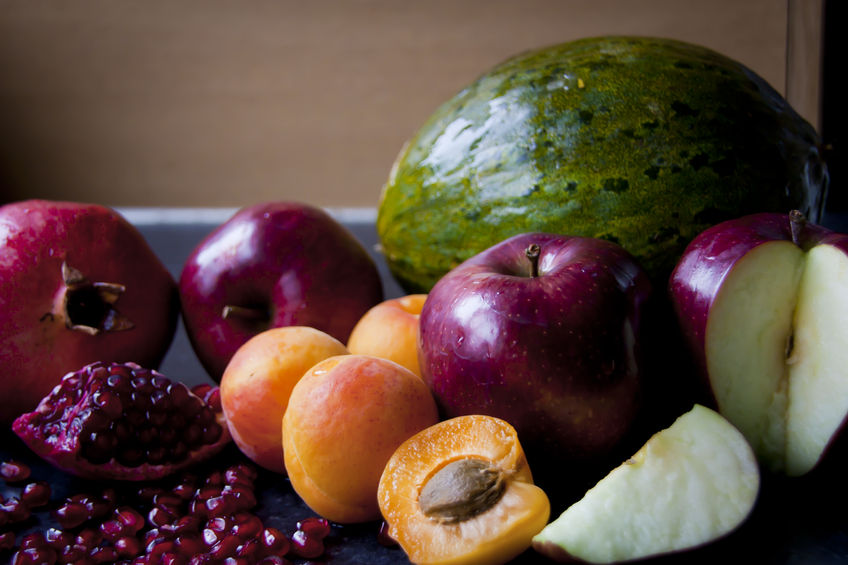Food Pyramid/My Plate: Fruits
Next up on our journey through the Food Pyramid/My Plate: Fruit! Most people enjoy fruit as it is naturally sweet and delicious. Most fruit is high in water, vitamins, fiber, minerals, enzymes, antioxidants, and phytonutrients. Fruit has numerous health benefits and should be a part of your daily diet. Here are some of my favorite fruits and why!
1. Apples are one of the best fruits to incorporate into your diet. They have numerous health benefits including reduced risks of cardiovascular disease, lung cancer, asthma, type-2 diabetes, and high cholesterol. (1) Apples contain antioxidants, potassium, pectin, and other important nutrients. Many of the nutrients are in the skin, so make sure to eat the whole apple.
Unfortunately, conventionally grown apples are one of the most highly pesticide sprayed fruits and are often coated in a wax to make them look more appealing. I never eat apples that look unnaturally shiny! Buy organic apples to ensure they are pesticide and wax free.
2. Lemons, limes and other citrus fruit are wonderful for your health. Lemons are very low in natural sugar and are great for alkalizing your body, removing toxins, supporting your immune system, and stimulating your digestive system. Drinking warm lemon water from a freshly squeezed lemon first thing in the morning is one of the best healthy habits you can adopt. Lemons are full of vitamin C, calcium, iron, magnesium, potassium, and manganese.
3. Darkly colored berries such as blueberries, blackberries, goji berries and strawberries are very high in antioxidants which protect your body from cancer-causing free radicals. They have also been shown to improve memory and brain function and to lower the risk of age related diseases such as Alzheimer’s. Berries are another fruit that is important to buy organic in order to avoid harmful pesticides.
4. Watermelon is another delicious fruit with numerous health benefits. Its high water content makes it very hydrating and cleansing. It is high in vitamin C, beta-carotene, potassium, and lycopene. Watermelon is the most alkalizing fruit you can eat! It has been shown to lower risks of multiple cancers, heart disease, and degenerative eye problems.
Juiced, Frozen and Dried
It is best to consume fruit in its whole, raw form. Most fruit juice has been pasteurized with high heat, destroying many of the nutrients. It is also lacking the fiber your body needs to slow down the digestion of the natural sugars. This causes your insulin levels to rise too quickly which can contribute to weight gain and diabetes. Many fruit juice products also have added sugar, food colorings, and other artificial ingredients. Avoid fruit juice from concentrate as well.
If you do drink fruit juice once in a while, choose a brand that is cold pressed as this process leaves the nutrients intact. Also, choose a brand that is organic as you do not want to drink concentrated pesticides. I love the brand Suja, which is a combination of organic, cold-pressed vegetable and fruit juice. (2) Make sure to brush your teeth soon after consuming fruit juice so that the sugars do not remain on your teeth and contribute to decay.
If you do not have access to fresh fruit, frozen fruit can be a good replacement and is great for adding to smoothies. You can also purchase fresh fruit when it is in season and then freeze it for the colder months when fresh fruit can be expensive and may have traveled a much further distance to get to your local market. Dried fruit is also a good option as long as it does not have any added ingredients. Avoid “fruit cocktails” which are full of high fructose corn syrup, artificial colors and other unhealthy ingredients.
The Dirty Dozen and the Clean Fifteen
Every year the Environmental Working Group publishes their list of the 12 most important produce crops to buy organic, and which crops are safest to eat conventional (non-organic.) This is especially helpful for those of us who are trying to eat healthy on a budget! Some plants have more natural protection against pests and need less chemical pesticides, while others are more prone to insect damage (usually due to conventional farming practices.) Others have a peel that you remove such as kiwi and pineapple, which protects you from most of the pesticides.
For 2015 the Dirty Dozen list (and the produce MOST important to buy organic) includes apples, celery, cherry tomatoes, cucumbers, grapes, nectarines, peaches, potatoes, snap peas, spinach/kale/collard greens, strawberries, and sweet bell peppers.
The 2015 Clean Fifteen list includes asparagus, avocado, cabbage, cantaloupe, cauliflower, eggplant, grapefruit, kiwi, mango, onion, papaya, pineapple, sweet corn, sweet peas, and sweet potato. (3)
Resources:
1. Dee McCafferey, CDC, The Science of Skinny (Boston Massachusetts, 2012) 235-236.
2. http://www.sujajuice.com
3. http://www.ewg.org/foodnews/index.php












